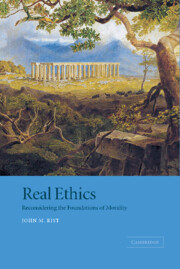Book contents
- Frontmatter
- Contents
- Acknowledgements
- Introduction: Ethical crises old and new
- 1 Moral nihilism: Socrates vs. Thrasymachus
- 2 Morals and metaphysics
- 3 The soul and the self
- 4 Division and its remedies
- 5 Rules and applications
- 6 The past, present and future of practical reasoning
- 7 Autonomy and choice
- 8 Ethics and ideology
- 9 God and ethics
- Bibliography
- Index
6 - The past, present and future of practical reasoning
Published online by Cambridge University Press: 16 January 2010
- Frontmatter
- Contents
- Acknowledgements
- Introduction: Ethical crises old and new
- 1 Moral nihilism: Socrates vs. Thrasymachus
- 2 Morals and metaphysics
- 3 The soul and the self
- 4 Division and its remedies
- 5 Rules and applications
- 6 The past, present and future of practical reasoning
- 7 Autonomy and choice
- 8 Ethics and ideology
- 9 God and ethics
- Bibliography
- Index
Summary
POST-REALIST MORAL DEBATE
The quest might reasonably begin with an academic happening of 1992, when the Philosophical Review published a survey of what its authors saw as the principal trends in moral philosophy in the twentieth century. Since the survey may be taken as fairly representing the interests and judgements of the majority of Anglo-American philosophy departments, its emphases and omissions cannot but shed light on the present state of the subject. The authors begin with reactions to the work of G. E. Moore, treated as the last (if long expiring) gasp of ‘Platonic’ intuitionism, and proceed thenceforward in roughly historical sequence. Yet though they mention historicist critics, one of the effects of their presentation is to suggest that the contemporary problems they discuss represent the remaining range of worthwhile debate in moral philosophy. They offer little hint that moral ideas exist within traditions considerably affected by historical circumstances; instead they give the strong impression that philosophical problems arise in an insulated intellectual environment and derive from one another in more or less coherent logical sequence.
There is no reason to believe that this is correct. It is true, as Warnock once noted, that in regard to basic themes, assumptions and approaches in philosophy, as distinct from technical problems in logic, ‘the way an influential philosopher may undermine the empire of his predecessors consists, one may say, chiefly in his providing his contemporaries with other interests’; that is to say, the best way to discredit an opponent or an unwanted approach, solution or methodology, is to induce people to concentrate on something else – frequently what the ‘spirit of the age’ finds attractive for reasons largely unrelated to technical philosophy.
- Type
- Chapter
- Information
- Real EthicsReconsidering the Foundations of Morality, pp. 140 - 177Publisher: Cambridge University PressPrint publication year: 2001



